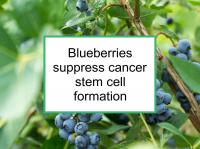Blueberries have been shown to inhibit both hormone receptor positive (ER+/PR+) and hormone receptor negative (ER-/PR-) breast cancer cell growth in the laboratory. In addition, blueberries also have been reported to reduce mammary tumor cell proliferation in animal models of breast cancer.
Blueberries contain numerous compounds with reported anti-cancer properties, among them resveratrol and pterostilbene. Resveratrol has been shown to increase the effects of radiotherapy, aromatase inhibitors and the chemotherapy drug paclitaxel (paclitaxel) against breast cancer.
Pterostilbene has been reported to inhibit obesity-related breast cancer growth and proliferation in the laboratory and to increase the effectiveness of tamoxifen in estrogen receptor positive (ER+) breast cancer cells. Now a new study has reported that pterostilbene can reduce the formation of breast cancer stem cells and inhibit their metastatic activities.
Role of breast cancer stem cells
Breast cancer stem cells have the ability to divide indefinitely, driving tumor development and metastasis. Breast cancer stem cells can exist in a quiescent state, thereby avoiding being eliminated by chemotherapy or radiation (treatment that might be effective when they are in an actively dividing state). Such stem cells lack the cell receptors of normal breast cells and, as such, are also insensitive to endocrine treatment. Breast cancer stem cells expressing CD44 (a cell-surface protein involved in cell-cell interactions, adhesion and migration) have been shown to possess the most metastatic potential.
Latest research finds pterostilbene inhibits stem cell formation
The study referenced at the beginning of this news story was designed to investigate the influence of pterostilbene on breast cancer stem cells and tumor-associated macrophages. Macrophages are white blood cells that engulf dead cells and foreign materials in order to rid the body of them.
Normal macrophages are part of a well-functioning immune system. However, tumor-associated macrophages enhance tumor progression by promoting cancer cell invasion, migration and angiogenesis.
In the study, the authors first demonstrated that coculturing hormone receptor positive MCF7 and triple negative MDA-MB-231 breast cancer cells with tumor-associated macrophages increased the percentage of CD44+/CD24− cancer stems in the cell population and increased the overall migratory and invasive abilities of the cells.
Treatment with pterostilbene was shown to overcome the tumor-associated macrophage-induced enrichment of the cancer stem cell population, as well as the metastatic potential of breast cancer cells, in a dose dependent manner.
The authors also conducted an experiment in mice bearing MDA-MB-231 tumors cocultured with tumor-associated macrophages. Pterostilbene was shown to suppress tumorigenesis and metastasis in the mice. The authors conclude that pterostilbene effectively suppresses the generation of cancer stem cells and metastatic potential under the influence of tumor-associated macrophages. Pterostilbene therefore has potential as an anti-cancer stem cell agent in breast cancer patients, according to the authors.
Please see our article on blueberries for more information.
